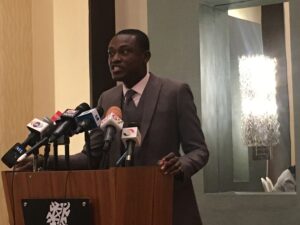Public institutions to submit Integrity Plans to Special Prosecutor

Henceforth, all public institutions, Departments, Agencies, and Companies would be required to prepare and submit Integrity Plans to the Office of the Special Prosecutor (OSP).
This is part of the requirements set by the OSP as part of the rollout of the Ghana Corruption League Table, a research-based model designed to assess real and perceived levels of public sector corruption.
The Project, spearheaded by the OSP, will rank public sector agencies against each other on a corruption barometer and the results would be published annually on International Anti-corruption Day.
Speaking at the launch of the League in Accra, Mr Kissi Agyebeng, the Special Prosecutor, said the initiative was akin to a combination of the Corruption Perception Index programme of Transparency International and that of Afrobarometer.
He said the results of the Project would form the basis for enhanced pragmatic suppression and repression of corruption in the public sector.
“To this end, and as required by regulation 31(2) of the Office of the Special Prosecutor (Operations) Regulations, 2018 (L.I. 2374), the project would identify the causes that advance corruption in the public sector including deficiencies in regulations and procedures, deficiencies in administration of instructions (including lack of internal control mechanisms), individual interest (including greed, lack of ethicalness and legal awareness), and external influences (including public attitude, culture and traditions) – to facilitate the prevention of corruption,” he said.
Mr Agyebeng said the Integrity Plans to be submitted by all public institutions would assess the deficiencies in their regulations, procedures, policies, guidelines, administration instructions and internal control mechanisms.
That, he added, would help to determine the vulnerability and exposure of public institutions to corrupt practices and help manage their susceptibility to corruption and corruption-related offences.
“In sum, we will be documenting corruption, measuring corruption, ascertaining the breeding of corruption, naming and shaming peddlers of corruption, accessing the impact of anti-corruption initiatives and taking curative and remedial measures to crack down corruption,” he said.
Mr Alfred Tuah-Yeboah, the Deputy Attorney General and Deputy Minister of Justice, said he was confident that the Corruption League Table would be used as an important gauge by the public sector agencies in managing corruption risks when conducting businesses.
“It will prompt the agencies to review their compliance programmes, identify any compliance risks that may be previously undetected and make adjustments accordingly,” he said.
Mr Tuah-Yeboah rallied the citizenry to support the Government to combat corruption, stressing that the Government alone could not eliminate the canker.
“Drawing lessons from a compendium of case studies from around the world, no government can fight corruption without the involvement of citizens.
“Corruption should be fought vigorously by all citizens. The fight against corruption should not be left in the hands of government alone,” he said.
The Office of the Special Prosecutor Act, 2017 (Act 959) which came into force on 2 January 2018, established the Office of the Special Prosecutor.
The OSP exist as an independent anti-corruption agency, with the mandate of investigating and prosecuting specific cases of alleged or suspected corruption and corruption-related offences in the public and private sectors.
It also has the duty to recover the proceeds of such acts by disgorging illicit and unexplained wealth and taking steps to prevent corruption.
Source: GNA
